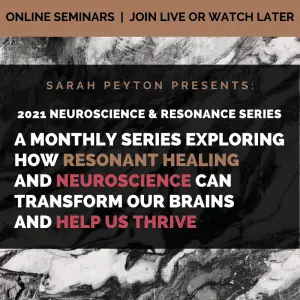Description
This is an all-in-one bundle that includes access to all of Sarah’s monthly Neuroscience and Resonance webinars for 2022.
By purchasing this package, you have the option of attending the webinar live each month, or watching the webinar recordings when they’re posted (generally within 72 hours after the live webinar).
The 2022 series includes the following topics:
- Re-Enchantment: As each of us lives through the wear and tear of everyday life, the world can lose its shine. We can become tired and overwhelmed with everything that is happening. How do we recover our delight, our energy, and our bounce? How do we fall in love with life again?
- Healing Imposter Syndrome: No matter how well you do, or how successful you are, do you often have a sneaking sense that something is wrong? That people don’t really know you? That if they did actually know you, they wouldn’t like you? Do you believe that you have somehow managed to fool the people who have a good opinion of you? If you have any of these experiences, you have touched what is called “Imposter Syndrome.”
- Naming, Understanding and Healing Collective Trauma: After bombings, earthquakes, tsunamis, floods, and other disasters, domestic violence rates increase by at least 50% in families for up to two years (and beyond). Collective trauma enters the bones of our families, changing childhoods, and creating imprints of stress and distress on people. Shame often follows the movement of collective trauma into family history – without any knowledge of the impact of collective trauma, people can ask themelves, “why does my family suffer from alcoholism, addiction, child abuse, or violence?” The naming of the impact of collective trauma is the first step in healing. What are the other steps that can be taken to support the healing of our families and our communities?
- Our Broken Fields: Projection and What Others See: Relationships can be confusing. What is ours? What belongs to others? Why do some of our qualities come out most clearly in some relationships and not in others? What are others seeing and why are they reacting to us the way we do? What is our own responsibility to heal and what can we let go of? Neuroscience and resonance let us enter the world of our relational shadows with a bit more clarity and a lot more self-compassion.
- ADHD: Understanding and Celebration: Research into ADHD and its effects, consequences, and strengths has been exploding. From implications for substance use and anxiety, sleep satisfaction and the ability to juggle multiple tasks. What are areas that need our care? And what are the areas worthy of celebration?
- Finding Gentleness with OCD: Do you ever find it difficult to live with the demands your brain makes on you? Is the price for saying “no,” higher than you can endure? What are the brain patterns with OCD? What parts of the brain are involved in OCD? What does research say is helpful? And what is it like to be in relationship with people with OCD?
- The Neuroscience of Violence: Why are some people violent and some people not? What are the precursors of violent behavior? What are the roots of violence in the brain? What neurotransmitters are involved? What is the transgenerational contribution, and what about epigenetics?
- Complex PTSD: Understanding and Healing: What are the aftereffects of receiving emotional, verbal, psychological, sexual or physical violence? What happens to brains when they endure long periods of time, trapped in a situation where violence is being done? How does “ordinary” PTSD differ from complex PTSD? How can we tell the difference, and how does our healing approach differ between the two? What should we look out for, and how can we distinguish the signs of healing?
- Warmth for Disillusionment: The Traumas of Political Disaffection: In these difficult times, it can be hard to retain our idealism. Yet, when we lose our idealism, we tend to lose our energy to create change. What can we hold on to, and hope for, in a world where our heroes are tarnished and our political parties seem to have lost their moral centers? What happens when we have warmth and resonance for our disillusionment?
- Dismantling Perfectionism: How often do you find yourself falling short of your own impossibly high standards? What purpose could our perfectionism, which so often tortures us so mercilessly, possibly serve? What are the contracts that take us into the self-cruelty of never being good enough, and can we release them?
- Gentrification, Community and the Brain: Does the neighborhood you live in have an effect on your brain? How about your community? How do we carry our communities within us? Why do people say that gentrification is the new redlining? What are the systemic implications for our sense of home and the ways that our brains work to integrate self and world?
- Sarah’s free 2022 Process Work Exploration




